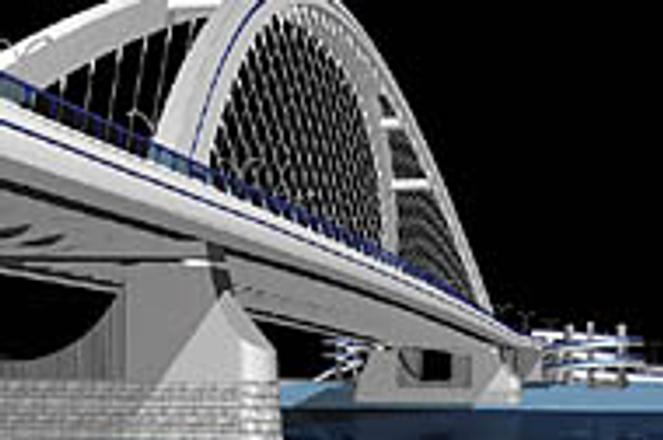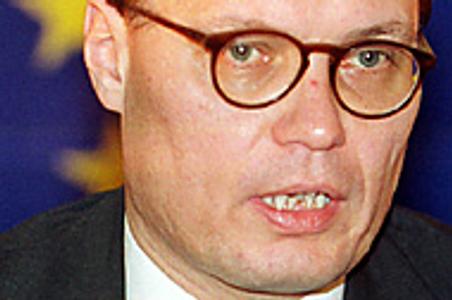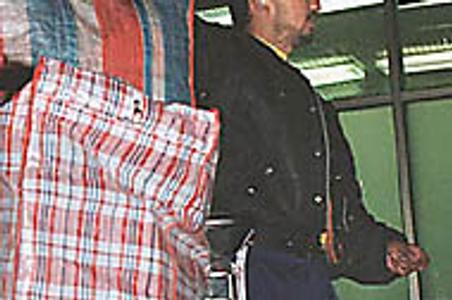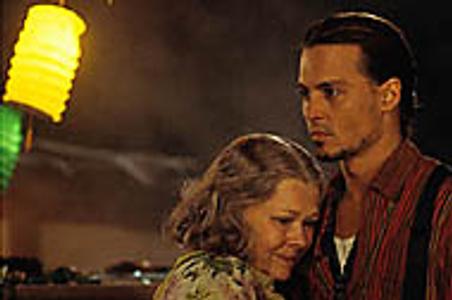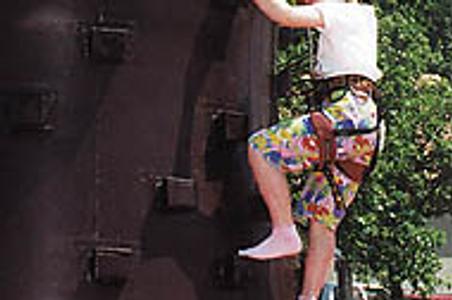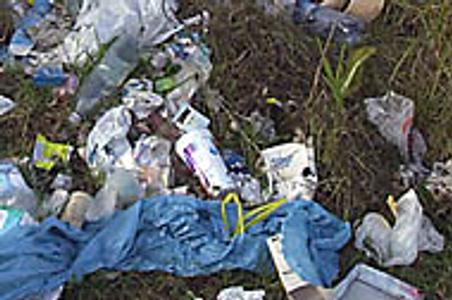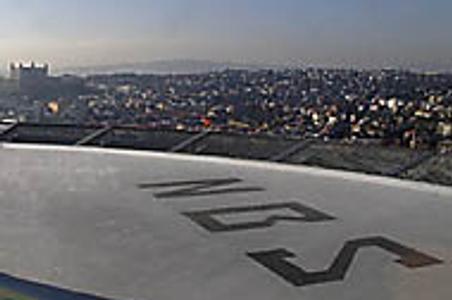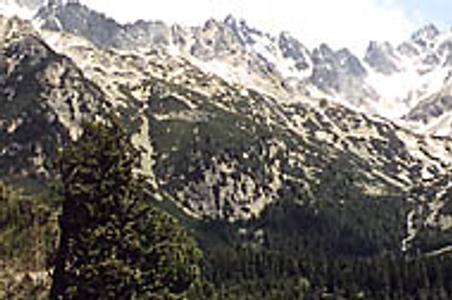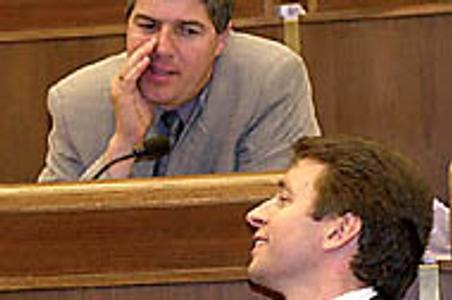Archive of articles - May 2001
If you desire to read an old article, use the search bar or select the publication date.
"This bridge is an absolute necessity"
Ludmila Helienková's Petržalka apartment is only a few kilometres from her job in Bratislava's city centre. But on busy mornings, her commute lasts up to half an hour."The bridges are always clogged," she said. "The worst is between 7:00 and 7:30. It's agony."Helienková isn't alone in her traffic ordeal. Each day up to 70,000 Petržalka residents cross Bratislava's four bridges to work in Bratislava's city centre, creating a gridlock that throws even public transportation off schedule. Traffic jams are becoming more severe with Bratislava residents purchasing roughly 25,000 new cars annually.
EC delegation to Slovak cabinet: "Get on with the job"
In Brussels has received both good and bad news in the last several months concerning Slovakia.The worst of it has been a scandal over the possible misuse of European Union (EU) funds sent to Slovakia through programmes like PHARE and ISPA, which sink EU taxpayer money into everything from the upkeep of cross-border hiking trails to maintenance of nuclear plants.Under suspicion that an employee of the Slovak Office of Government, Roland Tóth, was abusing his influence on a tender process for PHARE and ISPA funding under the control of the European Commission (EC), an EU ruling body, Slovak Deputy Prime Minister for European Integration Pavol Hamžík fired Tóth on March 14.
How the recycling fund works:
Waste producers and importers will pay as yet undetermined charges to the Recycling Fund per unit of waste they produce, divided into 11 categories.* The 11 categories of waste are: car batteries and accumulators, waste oils, tires, paper, glass, scrap cars, electronic waste, plastic materials, ferrous packaging, multi-layered packaging, mercury bulbs.* The Fund's board will then allocate the money to businesses and projects that recycle waste.
Media storm as PM gives Markíza scoop
A letter of protest signed by the editors of eleven Slovak media was dispatched on May 22 to the office of Prime Minister Mikuláš Dzurinda. The editors complained that the Slovak leader had shown favoritism to a powerful private TV station over other media by interrupting ruling coalition negotiations to give the station an exclusive live interview.The formal protest had begun as an irate response by some journalists covering the government meeting in western Slovakia's Trenčianské Teplice late on May 18. Having waited over three hours outside the building where cabinet was sequestered, most of them missed their deadlines and were forced to return to Bratislava with only wet clothes to show for their trip.
Roma fight Belgium at European Court of Human Rights
A Slovak Roma family who sought asylum in Belgium in 1998 is suing the Belgian government for allegedly violating the family's human rights while expelling them from the country. The case entered its first hearing May 15 at the European Court of Human Rights in Strasbourg.Slovak Roma Ján Čonka, his wife Mária Čonková and their children Naďa and Nikola alleged that their human rights were violated in October 1999 (11 months after they had first entered Belgium to request asylum) when Belgian authorities ushered them and a group of 70 other Slovak Roma onto an aircraft bound for Košice, a city in the east of Slovakia.
News Briefs
Financial Control and Audits Law passedDeputy PM says Roma exodus an organised businessMarkíza influence noted by media industry watchdogHouse of Foreign Slovaks to be disbandedCabinet reform appointee still hopefulCivil Code amended to help evict tenants
Review: Chocolat serves up a well-confected plot and cast
The makers of Chocolat followed a simple recipe: mix one heaping tablespoon of tried-and-true actors with a dash of classical music and jazz, roll into a heart-warming plot and bake in an eccentric French village.The result: a film that is light and sweet at first bite, but which leaves a rich and gratifying aftertaste.Juliette Binoche stars as Vianne, a vagabond chocolate maker who arrives "on a sly breeze" one day in a puritanical French village where "if you saw something you weren't supposed to see, you looked the other way". Her timing couldn't be worse: the Christian holiday of Lent has just started, and in this part of la campagne, that means six weeks of strict self-denial. Even croissants and jam are forbidden.
E-signatures law on way to parliament
In a move that brings Slovak legislation closer to that of many European Union member states, the Slovak government May 16 approved a draft of a long-awaited Law on Electronic Signatures. The draft would give documents in electronic form - for example, tax declarations filed over the Internet, or electronic business contracts between suppliers and consumers - equal legal status to traditional, printed documents.
Coke fizzing over new Recycling Fund
As part of a new Waste Law passed by parliament May 15, a Recycling Fund headed by industry representatives, and to which producers of 11 kinds of waste (see chart below) would be obliged to contribute, would come into existence as of January 1, 2002.One of the fiercest opponents of the proposed Fund, Coca-Cola Slovakia, has noted the new law does not specify how the Recycling Fund will spend its money, and has said it fears the new body will make inefficient use of levies and misallocate funds.But the firm says it has identified an escape hatch. By using a special clause in the new Waste Law, producers can recycle products themselves or in concert with other firms, and in turn reduce their contributions to the Fund proportionately to the volume of waste they recycle. This, Coke says, means they can ensure industry levies for recycling are used efficiently
What the draft of the new Banking Act says:
* the central bank would be obliged to set down specific criteria for separate bank licence applications in various fields, e.g. mortgages, construction savings* the central bank would be obliged to deem an entity 'trustworthy' i.e. suitable for a licence, if it had not previously been fined in excess of 500,000 Slovak crowns in connection with banking operations* the central bank would be obliged to grant a bank licence only to a 'trustworthy' entity
Top Pick: Polylingual mime to play in Bratislava festival
Barbara Čurda, a citizen of both France and Austria, is a mime who draws her inspiration from Indian mythology, whose lore she absorbed during her eight years in the Asian nation. Although fluent in five languages, she said she preferred to portray her characters in silence."Silence allows me better to express the different feelings of my characters through my body movements," she says. "Indian literature is very rich, and has given me a wealth of characters to draw on."She has made a believer of Slovak mime Milan Sládek, for one. Sládek, director of the Slovak pantomime theatre Aréna, invited Čurda to be among the 11 world-famous mime artists and troupes who have gathered in Bratislava for the 6th annual International Pantomime Festival, known as Kaukliar 2001. Playing from June 1 to 10, the festival opens with Sládek's latest play, "The Three Penny Opera", in which Aréna mimes make use of a giant puppet as a stage prop.
MPs unite on recycling law
In a hallway outside Božena Gašparíková's office there are four different bins for recycling office waste."It's an image thing. You know, we're the Environment Ministry..." laughs the head of the ministry's legislative department as she sits down to explain the country's recently-passed Waste Law.While the ministry may be concerned that its image is in keeping with its work, the passage of the Waste Law May 15 in an almost unprecedented show of parliamentary unity - 115 out of 119 MPs in the 150-seat legislature voted in favour of the bill - showed that its endeavours are taking on substance as well.
Slovaks leap forward in EU entry race
Slovakia May 17 closed a further four 'chapters' of the European Union's acquis communautaire - a document laying out legislative changes prospective members must make in 29 areas - prompting Prime Minister Mikuláš Dzurinda to declare the country on an accession par with its regional neighbours, Hungary, Poland and the Czech Republic.Although not having opened as many chapters as its three neighbours, by finishing negotiations on telecom and IT, social policy and employment, commercial law and free provision of services, Slovakia now stands ahead of the Czechs (15) and Poles (15), but behind Hungary (18) with 16 of 29 EU chapters closed. Slovakia has begun negotiations in another eight, but has not touched five.Slovakia's chief negotiator for EU accession Ján Figeľ said he was confident the remaining chapters could be opened by June, but warned Bratislava could not take relax its EU entry efforts.
Around Slovakia
Undisciplined hens cause four cars to crashRare poisonous snakes found in mail parcelPolice swoop on women-trafficking gang
Banking on change
In a report on the central bank's governance of the banking sector, the International Monetary Fund (IMF) at the end of May said that despite a willingness among National Bank of Slovakia (NBS) leaders to improve supervision, "bank soundness continues to be a source of concern".A mission from the international fund, which visited Slovakia at the beginning of May, stated in its evaluation report that the NBS had:* insufficient legal enforcement powers
Letters to the editor
Corruption comes as no surpriseDear Editor,These "friendly people" aren't always welcomeWhat else can we do but agree with you?
What the new waste law will change
* Individuals, rather than municipalities as under current law, are classed as waste producers, and thus can be fined if they don't adhere to municipal waste management rules.
Afoot in the Tatras
On a recent spring day in the Vysoké Tatry (the High Tatras), I had planned to travel along the electric rail line which connects the major Tatra resort town of Štrbské Pleso in the west to Tatranská Lomnica in the east.But sitting in Štrbské Pleso, with the sun shining and the temperature touching 20 degrees, I did what any right-minded visitor to Slovakia's magnificent mountains would do: I hiked.Although the two towns are connected by rail, they are more satisfyingly linked by foot. For those seeking a challenging day-long hike, the trail between the two can be navigated in less than eight hours (not including breaks).
Political crisis endangering reform
The Slovak government is mired in a serious crisis which last week defied two attempts to bring it to heel. Neither a six hour special cabinet session May 18 in western Slovakia's Trenčianské Teplice, nor a further four hours in Bratislava May 22 produced agreement on a cabinet shuffle that had been demanded by at least three of the ruling coalition's five parties.The stymied talks, from which Prime Minister Mikuláš Dzurinda emerged with an even stronger position than he had occupied before, according to analysts, spelt the virtual end of any further reforms the government had promised to carry out in its 1998 programme manifesto. While the Dzurinda cabinet still has 16 months left in its term in power before the next elections in 2002, they said, it appeared the member parties had abandoned serious work in favour of jockeying for electoral support.
- Top 10 events in Bratislava for foreigners
- No more photos or bank statements? Slovakia moves to ease residence process
- Weekend: Celebration of fun comes to Malacky Photo
- News digest: Fico’s bloc wants to save money by restricting electoral access
- Slovakia loses another EV model to Spain as Stellantis chooses Zaragoza over Trnava
- 3 free things to do in Bratislava in the next seven days
- News digest: Prosecutor seeks jail for NBS Governor Kažimír as his political support wanes
- Maria Theresa on the banks of Bratislava
- Maria Theresa on the banks of Bratislava
- No more photos or bank statements? Slovakia moves to ease residence process
- 3 free things to do in Bratislava in the next seven days
- Weekend: Celebration of fun comes to Malacky Photo
- Digital Jarvis is real now. He is coming for your to-do list
- Top 10 events in Bratislava for foreigners
- News digest: Fico’s bloc wants to save money by restricting electoral access
- The disinformation scene has become a tool of media capture
- Maria Theresa on the banks of Bratislava
- No more photos or bank statements? Slovakia moves to ease residence process
- News digest: Violent gang in Bratislava is under arrest
- The Kremlin’s security agency has a Russian contractor in Slovakia - no one has noticed
- 3 free things to do in Bratislava in the next seven days
- Digital Jarvis is real now. He is coming for your to-do list
- Weekend: Celebration of fun comes to Malacky Photo
- The disinformation scene has become a tool of media capture
- Maria Theresa on the banks of Bratislava
- A mayor resigns over €2.7 million fraud scandal at town hall
- Show me your moves! Slovak hockey stars share their best pick-up lines
- No more photos or bank statements? Slovakia moves to ease residence process
- He designed Gatwick. But this is his masterpiece
- Fico praises China and Vietnam as models, says liberal democracy has failed
- News digest: Violent gang in Bratislava is under arrest
- The compass points to Kúty, and people are starting to follow
- News digest: Prosecutor seeks jail for NBS Governor Kažimír as his political support wanes
- Slovakia loses another EV model to Spain as Stellantis chooses Zaragoza over Trnava
- Slovak female triathlete shatters barriers with historic win at Himalayan event
- Weekend: Celebration of fun comes to Malacky Photo
- News digest: Fico’s bloc wants to save money by restricting electoral access
- Slovakia plans to restrict access to new medicines amid funding shortfall
- No more photos or bank statements? Slovakia moves to ease residence process
- Top 10 events in Bratislava for foreigners More articles ›

